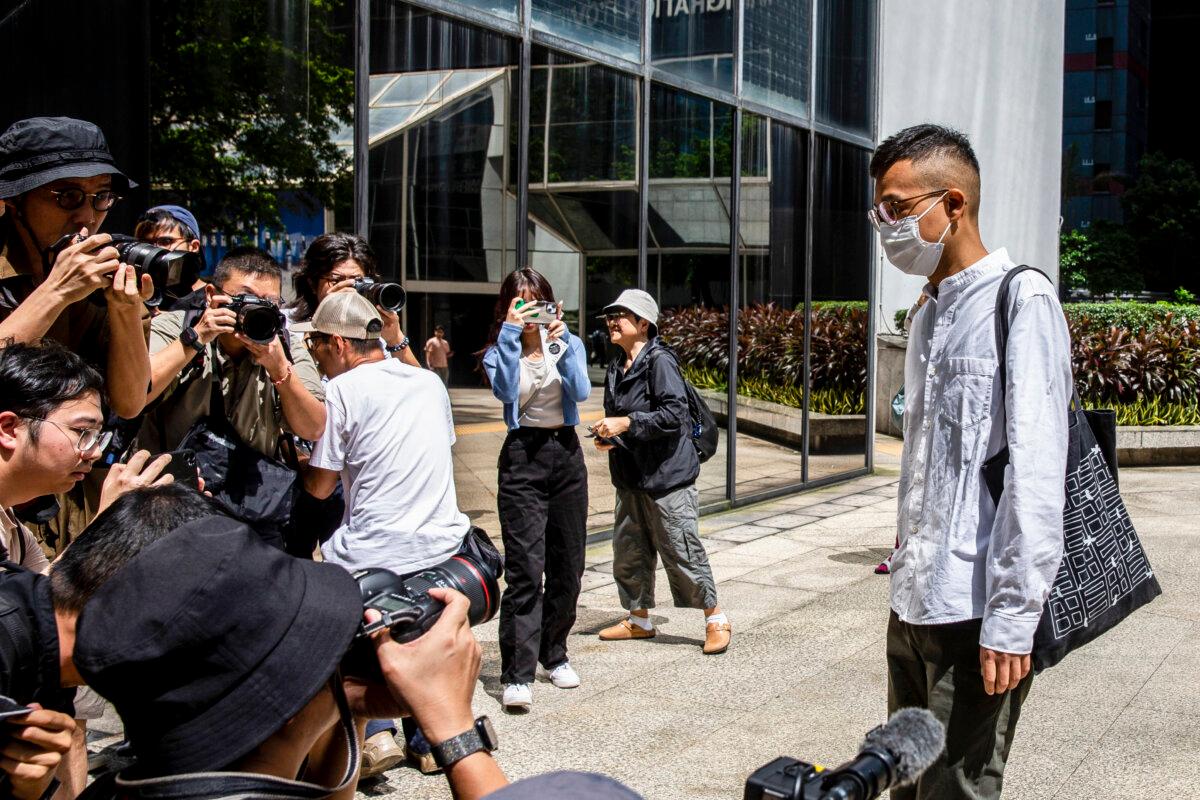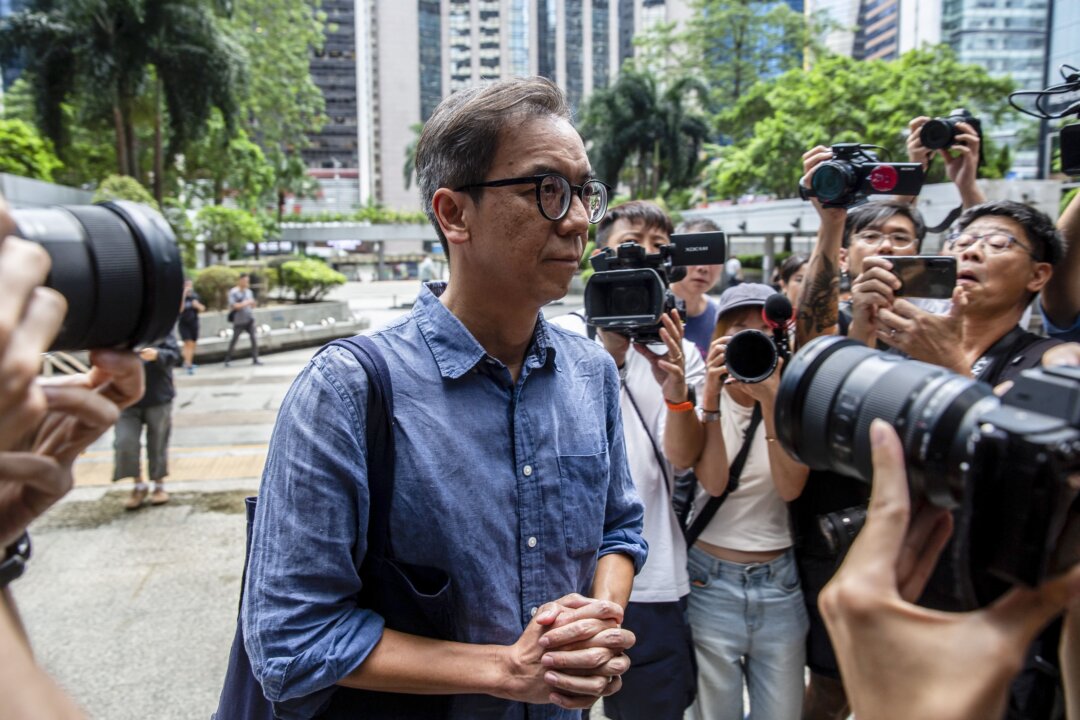This is the first prison term handed down by Hong Kong’s court in a sedition case against journalists since the city’s handover to Beijing in 1997.
The former editor of a Hong Kong media outlet was sentenced to 21 months in prison on Sept. 26 in a landmark case that was widely seen as a sign of deteriorating media freedoms amid a years-long clampdown by China’s communist regime.
Chung Pui-kuen, former editor-in-chief of the now-shuttered pro-democracy Stand News, was convicted along with his colleague, Patrick Lam, of publishing “seditious” articles under a law dating back to the time when the city was a British colony.
Lam also received an 11-month prison term, but because of his poor health and the time he had already spent in custody, he was immediately released.
This is the first jail term handed down by the city’s court in a sedition case against journalists or editors since the UK handed over Hong Kong to Beijing in 1997.
Chung, 54, and Lam, 36, were arrested in December 2021 and detained for more than 300 days. They were released on bail in late 2022.
Sentencing
The journalists’ lawyer, Audrey Eu, requested sentence mitigation for Lam, citing his diagnosis with a rare disease that had led to a 70 percent decrease in his kidney function. Should Lam be sent back to prison, it could endanger his life, according to Eu.
She argued that both men should be sentenced to only the time they had already served. Lam and Chung were detained for 313 days and 349 days, respectively, before being released on bail in late 2022. She argued that was equivalent to serving 15 to 16 months in prison. Considering that the maximum sentencing of the charge is two years imprisonment, she told the court that the defendants had already served most of their terms. If they were to be brought back to prison, it would cause great burden and anxiety as they had been released on bail for nearly two years, she said.
In his sentencing, Judge Kwok Wai-kin dismissed the defense’s argument that the journalists had unintentionally violated the law and accused them of siding with the protesters. He said that since their media outlet had a mass following, the seditious articles caused serious harm to the Chinese regime and the Hong Kong government.
Jailed for ‘Doing Their Job’
Shortly after the court’s sentencing on Sept. 26, human rights groups issued statements pleading for the judgment to be overturned.
“Chung Pui-kuen and Patrick Lam were serving the public’s interest by covering social and political issues in Hong Kong and should never have been detained, let alone sentenced to prison,” Cedric Alviani, Asia-Pacific bureau director at Reporters Without Borders, said in a statement.
“We urge the international community to intensify its pressure on the Chinese regime to secure Chung’s release, alongside the 10 other journalists and press freedom defenders detained in the territory.”

Amnesty International’s China director, Sarah Brooks, condemned the jailing of the two journalists, emphasizing that they had not committed any internationally recognized crime and were just carrying out their professional duties.
“The jailing of two journalists simply for doing their job makes this another bleak day for press freedom in Hong Kong,” Brooks said in a statement.
‘Direct Attack on Media Freedom’
The nonprofit media outlet Stand News gained popularity for its coverage of mass pro-democracy protests that rocked Hong Kong in 2019. However, with the Chinese Communist Party imposing the tough national security law, the independent media outlets in Hong Kong have become the target of pro-Beijing authorities.
In December 2021, more than 200 national security police barged into Stand News’s local office and arrested seven employees, including its then-current and former editors and board members. In less than 24 hours, the outlet announced the immediate cessation of its operations and deleted its websites and content on social media.
The closure of Stand News occurred only six months after a similar clampdown on Apple Daily, another pro-democracy tabloid in Hong Kong. After its newsroom was raided by 500 police officers and its executives arrested, Apple Daily published its final edition and ceased operations in June 2021. Its founder, Jimmy Lai, is now battling national security charges that could lead to a maximum sentence of life imprisonment.
In August, the Hong Kong District Court found Chung and Lam, along with Stand News’s holding company, Best Pencil (Hong Kong) Ltd, guilty of conspiracy to publish and reproduce seditious materials.
Judge Kwok Wai-kin wrote in his verdict in August that Stand News had become a tool for smearing the Chinese regime and Hong Kong government during the 2019 protests. He ruled that 11 articles published under the defendants’ leadership carried seditious intent, including commentaries written by activist Nathan Law and veteran journalists Allan Au and Chan Pui-man. Chan, who is also Chung’s wife, earlier pleaded guilty in the Apple Daily case and is in custody awaiting her sentence.
The convictions of Chung and Lam have ignited widespread concerns and condemnation from Western governments. The United States described the situation as a “direct attack on media freedom,” saying it undermines Hong Kong’s “once-proud international reputation for openness.” The European Union labeled it as “another sign of the dwindling space for press freedom.”
Hong Kong was ranked 135 out of 180 territories in Reporters Without Borders’ latest World Press Freedom Index, down from 80 in 2021 and 18 in 2002.
Brooks said the sentencing was designed to “reinforce a ‘chilling effect’ that dissuades others in the city—and beyond—from criticizing the authorities.”
“It is rule by fear,” she said.
There are growing concerns that the city’s diminishing press freedom could face even more constraints following the adoption of new national security legislation in March. The legislation punishes offenses such as treason, insurrection, and sabotage with a maximum penalty of life imprisonment.
The Epoch Times’ Hong Kong edition and The Associated Press contributed to this report.

